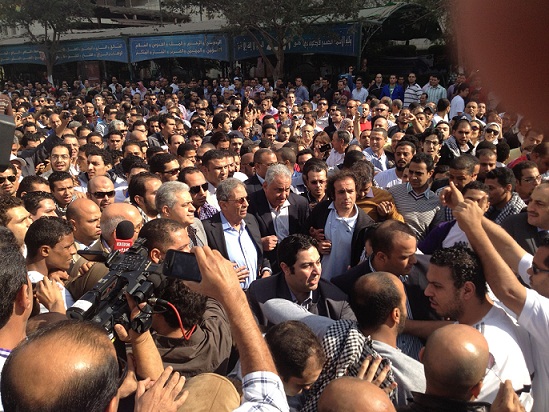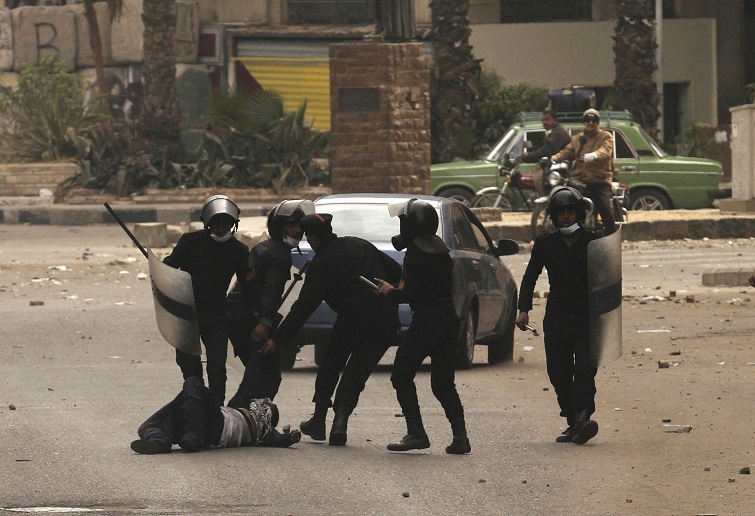Western governments ignoring Cairo’s successful mediation efforts
CAIRO: Furious diplomatic shuttling between European capitals and Cairo has paid off for a six-month mediation effort by some of this country’s top civil servants in brokering a deal on the crisis in Darfur.
In recent weeks, Egypt’s initiatives in trying to bridge differences between the United Nations Security Council and the United States on one front and the Khartoum government on the other have produced a working mechanism that in principle has been agreed to by all parties.
In Tripoli, Libya on Tuesday, President Mubarak met with Libyan leader Moamer Qaddafi and Sudanese president Omar al-Bashir to narrow differences between Khartoum and Washington.
The US position since early 2004 had been to threaten Sudan’s Arab government with economic sanctions and an arms embargo if it did not disarm the Janjaweed tribal forces that international relief agencies and the UN blame for most of the violence.
The Sudan government refused to disarm the Janjaweed, saying they were coming under attack by other tribes in western Sudan
Analysts interviewed by The Daily Star Egypt pointed out Cairo’s introduction of a third way offered both the US and Sudan an approach to quickly resolve the crisis. With so many refugees spilling into neighboring Chad and a rebellion gaining momentum there, the Darfur crisis had the momentum to explode into a regional and African conflict.
Egypt’s mediation also served its strategic interests and those of friendly regional nations such as Libya who did not want to see a large foreign contingent of peacekeepers. Consequently, Egypt’s third way was designed to bring both US and Sudanese concerns closer to convergence.
The Egyptian alternative accepts the presence of international troops and the increase in their power and eliminates sections related to executive and judiciary authorities, who led the Sudanese government to object it in the first place, explained Hani Raslan, an expert on Sudanese affairs.
When French Foreign Minister Philippe Douste-Blazy arrived in Cairo last week, it was to highlight Europe’s backing of the third way initiative.
There is initial conformity in Egypt and France s approach to the Darfur crisis in Sudan, on the features of the third route but the details are yet to be [discussed], Raslan told The Daily Star Egypt.
The French suggestion to deploy international troops under the command of the African Union is a compromise that the Sudanese government would accept, said Ibrahim El-Nur, director of African studies at the American University in Cairo.
He also noted that France in general could help resolve the crisis especially with its connections to armed parties in Darfur.
Currently, the ill-funded African Union troops can t control the situation in Darfur. And most recently, the head of the international envoy in Sudan, Dutch diplomat Jan Pronk, was expelled from the country for criticizing Khartoum’s actions in Darfur.
But the issue has more dimensions, especially since the US government has long rallied a stance different from the now internationally welcomed third route.
Raslan noted a conflict of interest between France and the United States in Africa, emphasizing that the European power, with strong ties to neighboring Chad, has vested interests to protect.
The French have a different approach because of their established interests in neighboring countries, said El-Nur. He said France is considered to be the original colonial power in francophone Africa.
A week before Douste-Blazy arrived in Cairo, the European Union’s foreign policy chief Javier Solana met with President Hosni Mubarak to iron out differences between the US and Sudan.
In Washington, the US State Department had been signaling to Egyptian diplomats privately that it was willing to back down on a strictly UN force in Darfur. When US officials went public with the news as early as October, it gave Egypt the impetus to pressure Sudan to accept a composite UN-AU force led by AU generals.
News of European and US envoys meeting with Arab League and Egyptian diplomats to iron out a deal on Darfur did not make headlines and only received scant mention in the Arabic-language press.
Egypt did not want to embarrass the government of Sudan and thereby impede the behind-the-scenes mediation Foreign Minister Ahmed Abul-Gheit had been implementing.
But media reports often must take a back seat to intense 11th hour negotiations and while Egypt was instrumental in bringing about a general consensus on its third way initiative, it did not want to highlight its diplomatic efforts lest the negotiating parties renege on their pledges.
Nabil Abdel-Fatah, from Al-Ahram Center for Political and Strategic Studies, told The Daily Star Egypt that Egypt’s mediating role in Sudan was an attempt to actually reduce the role of the international community in the war-torn country and was also an attempt to save face for the incumbent Sudanese government.
Abdel-Fatah said Egypt s role in Sudan had regressed in light of the increased interest of the US, UK and EU in the troubled African nation.
“The mediation is an attempt by Egypt to re-align and reduce the international role in Sudan. It is Egypt s wish to replace the UN multi-national force in Sudan with a pan-African one. So strong is Egypt s desire in this respect that it is contributing 17,000 soldiers, he said.
But in Addis Ababa, after meeting with UN, AU and Arab League officials, Annan announced Sudan had accepted Egypt’s third way.
This consensus confirms the importance of supporting the African Union force and the need to put all the technical and financial resources at their disposal, Abul-Gheit, who had been in the Ethiopian headquarters of the AU, told reporters.
But Egypt’s diplomatic efforts are not receiving the credit they deserve.
In an interview with Al-Jazeera International, Sir David Frost asked British Prime Minister Tony Blair about the apparent political resolution concerning Darfur. Blair ignored Egypt’s role in breaching the US-Sudan divide and instead lauded the efforts of UN Secretary-General Kofi Annan.

